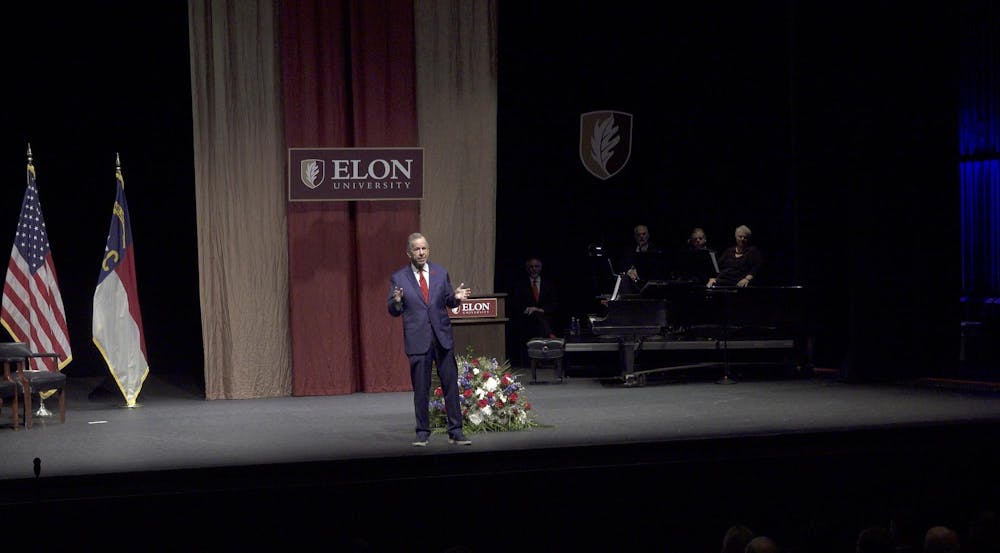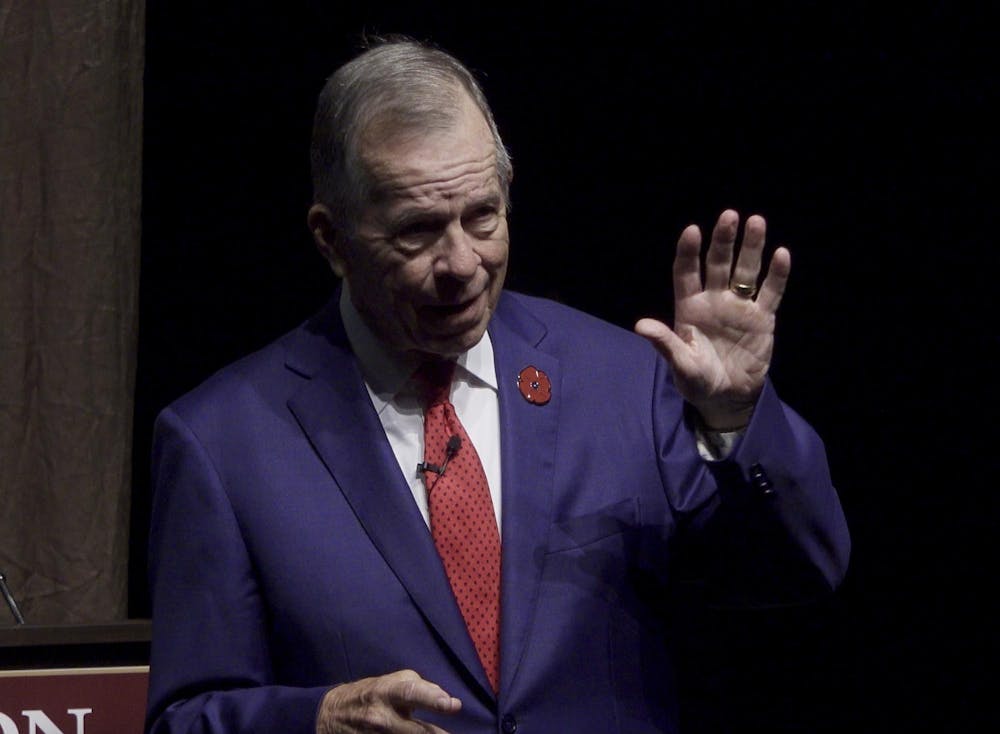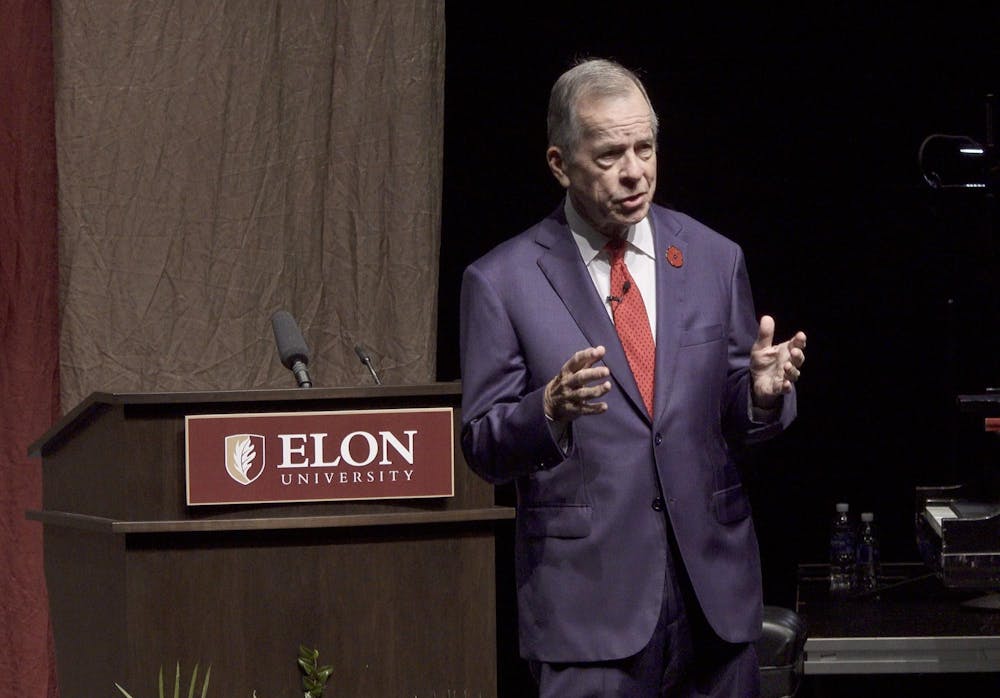As a part of the Veterans’ Day events --- Elon hosted retired Adm. Mike Mullen to kick off the Carol Ann Walker International Lectureship Series.
From 2007 to 2011, Mullen served as the 17th Chairman of the U.S. Joint Chiefs of Staff for former Presidents George W. Bush and Barack Obama. Mullen advised former President Obama during the raid on Osama Bin Laden’s compound in May 2011. Since retiring from active duty service, Mullen taught at Princeton University from 2012 to 2018 and currently teaches leadership and advanced ethics courses at his alma mater, the United States Naval Academy in Annapolis, Maryland.
As Mullen spoke to veterans and other Elon community members in McCrary Theatre on Nov. 11, he shared the ways in which the U.S. can better support veterans as they transition from active duty service to civilian life.
Mullen sat down with Elon News Network to discuss his views on the current state of support for veterans.
This interview was edited for clarity.
Can you tell me a little bit about why you're here today at Elon?
I was asked to come and give this inaugural Adm. Ted Walker speech. And coincidentally, I knew Ted Walker, who was an extraordinary guy, not just generous, but he was also a character. So it's a real privilege, one, and then secondly, to be able to come on Veterans Day and speak to an audience that is one very supportive of veterans, has a lot of veterans in the audience and to try to focus on the issues of the day that are affecting veterans, from employment to health to education. And obviously, Elon is very invested in this message, which I really appreciate. So that's the reason I came today, and I've also run into some old friends that I had no idea were here. So that was a pretty neat part of being here.

Retired Adm. Mike Mullen speaks to veterans and Elon community in McCrary Theatre on Veterans Day, Nov. 11.
Earlier, you spoke to that crowd, and you just came with another engagement too. Can you tell me about what you focused on today?
So the veteran side was to really try to broaden the expression of, ‘Thank you for your service,’ which people do, and I think they mean it all over the country, and, in fact, all over the world. It's just that the gratitude for me goes much deeper than that. And in fact, just walking into this interview, I ran into a mother who works here who's got a Marine son working in the helicopter world for the Marine Corps. And I'm always thankful that parents would raise young men and women to go do this and express that gratitude to her. But the veteran space, I've found out since I've been in it the last 14, 15 years, is a very difficult space. It's difficult to maneuver, it's difficult to understand the rules, and then, particularly if you're having challenges.
I talked about suicide today, which is epidemic. We're losing military members who were on the ground in Iraq and Afghanistan to these cancers generated by these burn pits. We've got too many homeless vets, and one of the things I've learned is they won't come to us. We need to go to them. We need to reach out in our communities, find them and figure out what support they need. And my experiences in the last decade plus is if there are a handful of leaders, two, three, four leaders, in a region, in a city, in a township, they can really customize the support mechanisms for the local space and really make a difference. So that's one of the things, one of the messages.
The other is these veterans who need so much help, they're a vast minority in terms of just the percentage and veterans want to work. They want careers. They're very talented people. Typically they have, they have not just the character they can lead. They're loyal, they're disciplined, they show up on time, they're good teammates, and so they're a good bet, as are their spouses. And so trying to encourage people to do as much of that as they possibly can and then here at Elon and other educational institutions, how do you take them in, as they transition from the military into the private sector, whether it's education or work. So, I've tried to focus on those three things – education, employment, slant careers as well as health.
In your personal experience, like you just said your transition from being enlisted to being a veteran, from being an active part of the military in multiple different ways. How was that transition for you personally?
Well, I was active duty for 43 years. I was tired, and actually I told a lot of people, I basically went to bed for a year because I needed to recharge. And if I'm honest about that, I've been working so hard at such a high level for a decade or so it took me about two years to get to some level of normal, whatever that is. It's been a long time since I've been there, but I'm at a level that I didn't really struggle with that, per se.
I had a lot of people that contacted me, and so I had opportunities, and I wanted to continue to contribute. I taught at Princeton for six years, I'm in my sixth year of teaching at Annapolis and of all the things I do, that's the best thing that I do, because I've always been around young people, obviously, with the military, but I've always tried to invest back at that level. And so teaching right now is really important to me, and having an impact on some young people in that regard is the highest priority that I have.
Outside, my family. I have six grandkids. I spent a fair amount of time with them, and then obviously their mom and dad. So it wasn't overly difficult for me, but I've seen it really be challenging for so many, and that's why one of the messages today is, please focus on the sergeants and the staff sergeants, the E5s and the E6s. The officers will be OK – typically, officers have an education, if not an advanced education. It's those E5s and E6s, and their spouses, that I really want the system to focus on.

Retired Adm. Mike Mullen kicks off the Carol Ann Walker International Lectureship Series with Veterans Day address Nov. 11 in McCrary Theatre.
Earlier in McCrary Theatre, you talked about the geopolitical nature of the military as well. And you mentioned that this is the “most dangerous time since the Cuban Missile Crisis.” In your opinion, what are you most concerned about right now?
A war with China, and the war with China over Taiwan. As I indicated when I, 17 years ago, when I took over as chairman from 2007 to 2011 and I worked for both Bush and Obama. Over that four years, I spent no time on Taiwan. My successors, the current Chairman, Gen. Brown, and his predecessor, Gen. Miller, spent an extraordinary amount in Taiwan. It is an economic engine that four of the five biggest economies in the world are centered in the Pacific region. And I'm someone who's believed for a long time, the economy sort of drives outcomes. And so, if we have a war out there with China as a great power war, everybody loses. We lose. China loses. And I actually think the world loses. And you've got 24 million Taiwanese citizens – roughly 20 million are freedom loving, democracy loving individuals that want to keep going like they're going and you've got a leader in China who says we need to reunify and is intent on reunifying. His public messaging is, ‘We're going to do this.’ And because we both have these nuclear weapons which could destroy the world, which at one point, I hoped we had, we could put aside and eventually eliminate, they are building them very rapidly, and so it's just getting more and more dangerous. So we could get in a war over Taiwan that theoretically could devastate the world. And that's what concerns me more than any other part of the world. It doesn't mean that Russia, Ukraine isn't a challenge, and what's going on in Gaza, there are hugely important challenges, but the most significant one, the most dangerous one is Taiwan.
You have experience with being behind the curtain, seeing the U.S. in their operations in the Middle East as well. Specifically, you mentioned the famous picture in the Situation Room. Can you tell me a little bit about using your perspective from being in the military in that decision making?
Well, the chairman of the joint chiefs, technically and legally speaking, is an adviser to the president and to the secretary of Defense. He's also the most senior military person in the country, and I chose to operate in that job as the senior guy. And so I'm tasked with giving the best military advice to the secretary of Defense and to the National Security Council as well as the president, and that's what I did routinely on a host of issues. And as has been said for decades, if an issue gets to the president, it's a really tough, complex issue, because if it isn't that, it'll get solved well below the presidency. So that was my principal responsibility, to include a recommendation on the Bin Laden operation, which is what you're asking about to go in to actually send the seals in. So for instance, there were three options. There was an option to use B 52 there was an option to use a smaller smart bomb. And then there was sending the seals. My recommendation was sending the seals, because I felt much more comfortable with that in terms of outcome, for example. So that's the chairman's job.
You talked about military and civilian life as well. What do you hope that the President-Elect Donald Trump will do for veterans?
My own view is the current administration has done well by veterans. There are less homeless [veterans]. The benefits are easier, they're still hard to get, but they're easier to get. Access is better, even though it's still really difficult. So, I would hope that President-Elect Trump, when he gets in, would be able to continue those trends, so that we continue to eliminate homelessness, we can create affordable housing for veterans and their families, that we can create careers for them, not just jobs, or look at opportunities to help them transition to careers, not just jobs. And then we can provide the benefit, the health care benefits, in particular, that are critical to the future. I mean, I said in the speech, veterans, a lot of them are pretty young, but after you're around a while, you start to really depend on good health care, and we need to be able to provide that for him as well. So I hope that President Trump could provide a boost in all those areas as we move forward.


